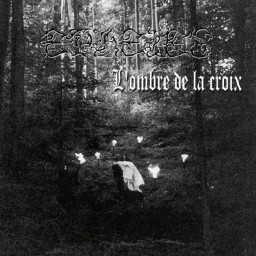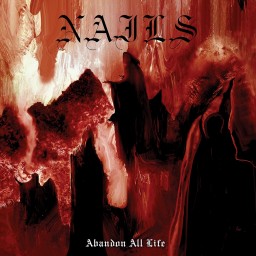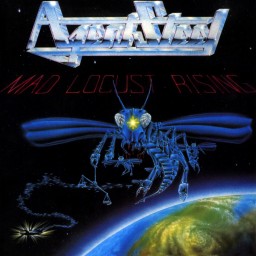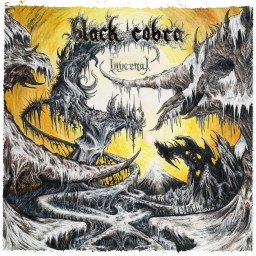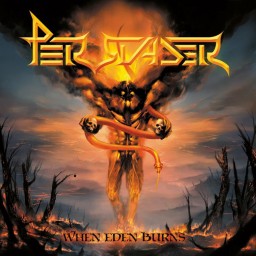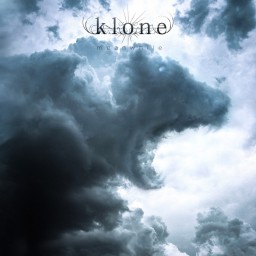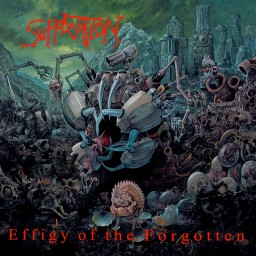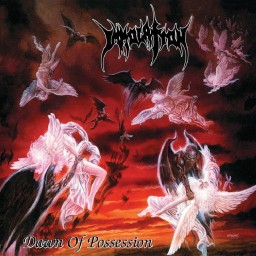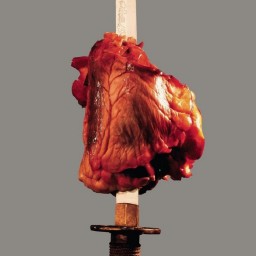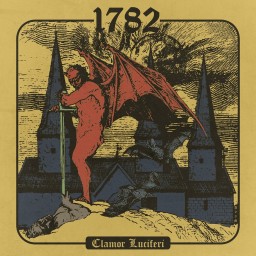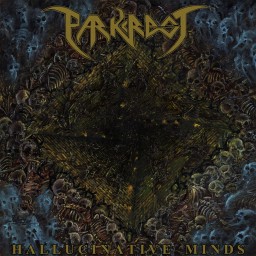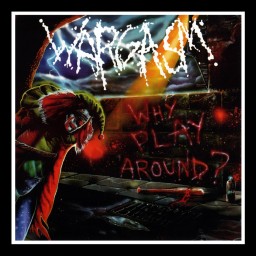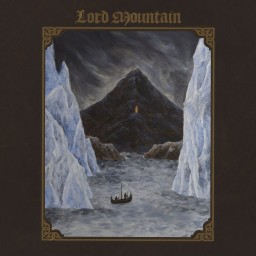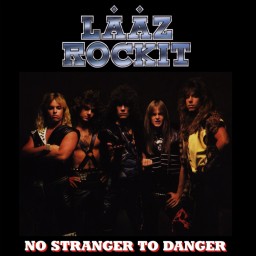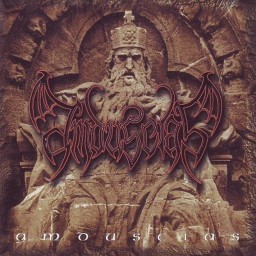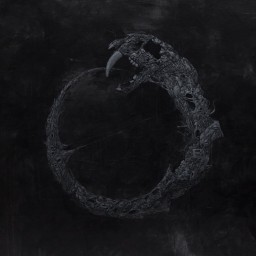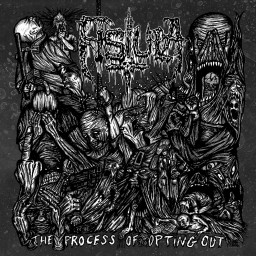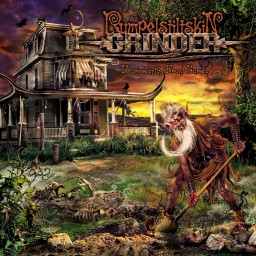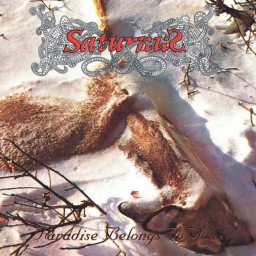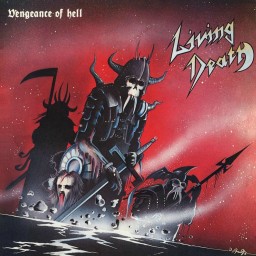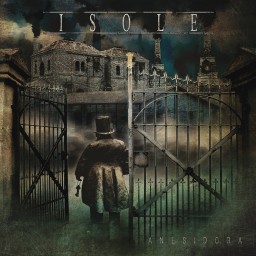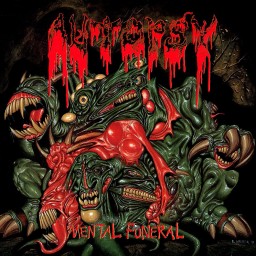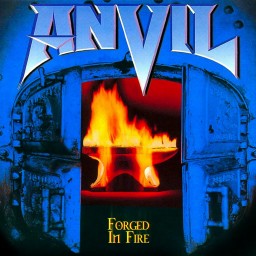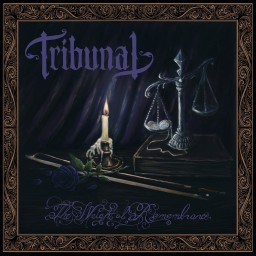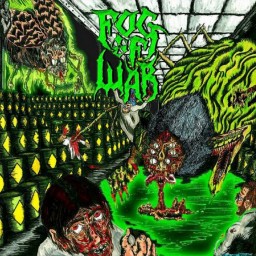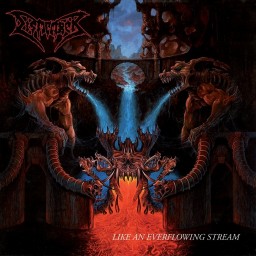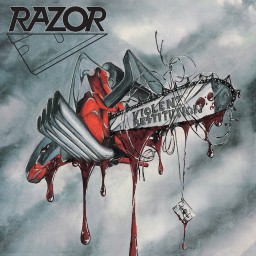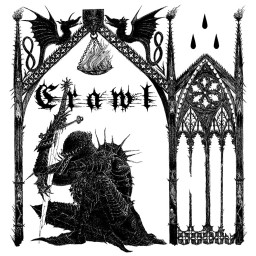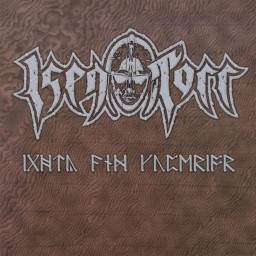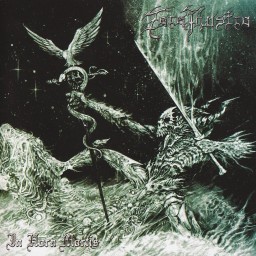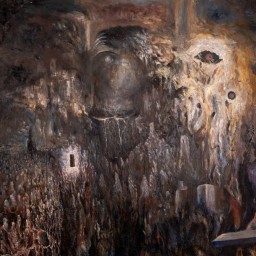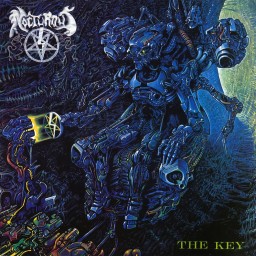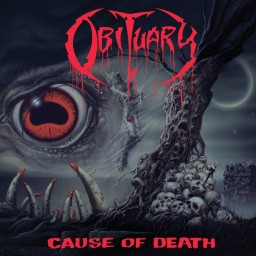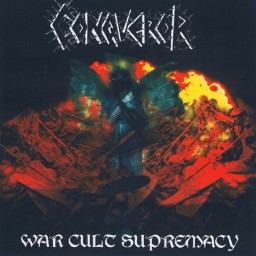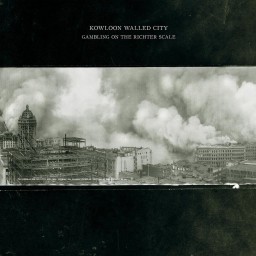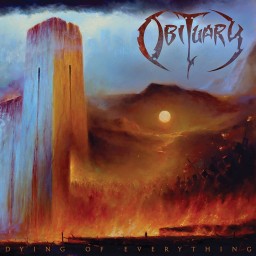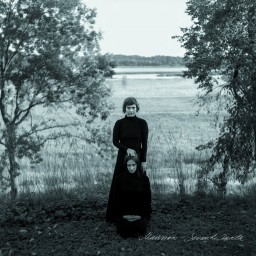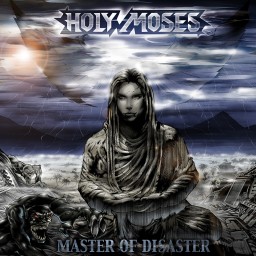Sonny's Reviews
Epheles were formed in 1997 by french brothers Malphas and Nephtys (possibly not their real names!) L'ombre de la croix is a four track mini album that marked the band's debut release, being released in May of 2001. It does suffer from some production issues and sounds like a reasonable quality demo, but as this is black metal we are talking about that is by no means an insurmountable hurdle. This is viciously feral-sounding black metal that is also incredibly atmospheric, despite some of the atmosphere being lost in the production. Along with the blasting and Nephtys' keening, shrieking vocals there is a liberal use of keyboard layering, ambient sections and slower riffing parts which makes the tracks feel quite narrative. Opener Winds of Despair, for example, tells the tale of the narrator's bleak existence since the death of his beloved, with lyrics that My Dying Bride would be proud of and sorrowful ambient parts that are usurped by rabid, raving shrieks and intense blasting as if his sorrow is unable to be contained.
Epheles songwriting is actually quite strong, especially the first couple of tracks which are the longest at nine and fourteen minutes and displays a strong sense of atmosphere and variety, whilst maintaining the fundamental essence of evilness that is the basis of black metal. Look, if you like your metal to be crystal clear and well-produced then you are best looking elsewhere, but if you thrive on the lo-fi gloriousness that really good black metal can possess then I think you may be pleasantly surprised by L'ombre de la croix.
Genres: Black Metal
Format: EP
Year: 2001
A nasty little burst of abrasive and aggressive grindcore that will give your ear'oles a good pummelling with most of it's ten tracks. It isn't exactly relentless, however as the two longest tracks are delivered at a more considered pace, but it is generally speaking an exercise in nothing less than aural violence. There is blasting aplenty and drummer Taylor Young is given a pretty intense workout, but luckily he seems more than up to the task. The guitar tone is brilliant, aided I believe by Kurt Ballou of Converge who was producer on "Abandon All Life", and maintains a terrific clarity despite it's thick crunchy sound.
The two slower tracks, that is " Wide Open Wound" and closer "Suum Cuique" are, unsurprisingly I suppose, the ones that appeal to me most, as they deliver more on the atmosphere front with looming, menacing riffs rather than just trying to blow your balls off! I guess grindcore records have to be taken as an overall package and the adrenaline-fuelling effect of the majority of the genre's output is the main thing as most of the songs display only minor differences in a lot of cases, and that is the case with some of the faster material here, but those slower tracks do give the listener a foothold into the tracklisting and "Suum Cuique" is actually a very effective, slower and brooding end to the record.
Where it loses marks for me, in what has become a bit of a theme with this month's features, is the vocal department. I prefer grindcore with a vocalist whose vocals are a bit more OSDM sounding like Barney Greenway or Terrorizer's Oscar Garcia and although Todd Jones doesn't actually hit "shouty toddler" level, he still sounds a bit metalcore-ish for my taste. The vocals aren't bad enough to be a deal breaker, though, and on the whole I did enjoy this a lot, it's variation in pacing and generally excellent instrumentation being huge plusses.
Genres: Grindcore
Format: Album
Year: 2013
OK, so this four-track EP is really only about two tracks, the first being an intro to the title track and the third being a fairly faithful cover of Judas Priest's The Ripper which reveals nothing other than that maybe Priest should have recruited John Cyriis insted of Ripper Owens when Rob Halford jumped ship.
So the two tracks in question, the title track and closer Let It Be Done / The Day at Guyana, are fairly decent thrashers that tick a lot of the boxes instrumentally but, a lot like this month's Fallen feature, suffer for me in the vocal department. Basically I don't like Cyriis' screeching vocals very much at all which, considering that I have no issue with either King Diamond or Cirith Ungol's Tim Baker, is damning indeed! I think Let It Be Done is by far the stronger of the two tracks (where the singing does least damage) and the closing Day at Guyana riff is a killer that seems wasted as a mere fade-out for the track. The title track is OK, but I wouldn't go overboard for it, although if Tom Araya was singing on it instead of Cyriis then it may have been a thrash classic.
I guess I would have to say that this slight EP has had very little impact on me and I don't really feel that I missed out on anything by it slipping past me first time around.
Genres: Speed Metal
Format: EP
Year: 1986
Invernal is composed of thick, dense riffs that are common in sludge metal but which also possess a thrashiness and complexity that is much less common in the genre. This makes the album sound more kinetic than the vast majority of sludge, which by it's very nature is a slothful style of metal, but there is more than enough doominess present, despite the uptempo pacing, to justify it sitting under the Fallen's umbrella. Instrumentally this is a really fine album, the complexity of the busy riffing on a track like Somnae tenebrae is exceedingly interesting and doesn't fall into the trap of excessive "jerkiness" that I feel with a lot of technical metal and all the tracks flow along really nicely. When the band do turn in a slower-paced riff like the early riff in Corrosion Fields then they build a nice, ominous atmosphere and they aren't afraid to occasionally insert a gentle post-metal section, such as during Abyss, to break things up a little and build anticipation for their next aural assault. The production is great and very clean-sounding, which isn't always a plus for a sludge metal album, but doesn't hurt the sound here and the riffs, although they aren't as muddy as those on many other sludge releases, have a depth and "crunch" that should satisfy all but the most demanding of sludge metal fundamentalists. It is fairly unbelievable to me that this has no bass at all, because the guitar sound has such amazing depth to it that you don't even notice the four-string's absence. The drumming is excellent, but is occasionally drowned out a little, particularly on faster sections like during the middle of Erebus Dawn, however, Rafael Martinez is a busy little bee and he turns in a performance to rival even Animal from the Muppets!
The "but" is coming now I am afraid, and it is the vocals that are the subject of it. Like Vinny I think the vocals are the weak point. I actually don't mind them per se, they are not as grating or ascerbic as some sludge vocals and they don't have the shouty, "spoilt toddler" quality that turns me off to other releases so often, but they just don't sit comfortably here with the instrumental work. I have seen elsewhere that there is little variety to be found on Invernal, which I would ascribe to the singing as it does seem to sound the same on nearly every track and the accusation of lack of variety can't really be laid at the door of the instrumentalists. Invernal would definitely benefit from a more aggressive-sounding and harsher singer I feel.
In summation, this is a really excellent album musically and the two guys have done a great job of sounding like twice that many, but they really should look at drafting in another singer to push them into the top echelon of sludge metal marvellousness.
Genres: Sludge Metal
Format: Album
Year: 2011
It's an understatement to say that I am not the world's biggest European Power Metal fan, but I can get along with it in small doses and whenever I am confronted by an album of EUPM, I hold out some hope that this will be the one to change my mind on the genre as a whole. Spoiler alert: this is not that album, but I didn't find listening to it to be a terrible chore either. Instrumentally When Eden Burns had a fair bit to enjoy with the odd killer, thrashy riff and some nice soloing on display. However, my primary and perennial issue with EUPM is in the vocal department where OTT delivery seems to be a requirement, as does the Queen-like layered backing vocals, all of which do sweet FA for me I'm afraid. Sure, I like vocalists who have range - I really dig such metal stalwarts as Dickinson, Halford and even Joey Belladonna - but there is just something about the lead vocals in EUPM that rubs me up the wrong way. The earnestness with which the lyrics are delivered is often just too much for me to take seriously and ultimately I find this area to be where the cheesy odour that pervades EUPM smells strongest. To be sure, Persuader vocalist Jens Carlsson is far from the most egregious example of OTT vocalists, but it's still a part of Persuader's sound, as are those irritating, choral backing vocals. Thankfully Persuader don't feel the need to double-down on the excess by drenching their sound with layer upon layer of keyboards and this is a wise move, because when they are at their best, ie when they are at their most thrashy they have quite a visceral sound, not unlike early Iced Earth.
I can't claim any great urge to revisit When Eden Burns after this and I know it may feel like I am damning with faint praise, but it is one of the least annoying euro-pm albums I have heard.
Genres: Power Metal
Format: Album
Year: 2006
Klone are yet another band I have been blissfully unaware of until now. Meanwhile is the latest of the band's eight albums and is quite a nice album of progressive alternative metal. The band are very accomplished musicians, obviously, and their sound is highly polished, as is their songwriting, for me a little too polished. At first this sounded great, but as the album proceeded it felt so controlled that it came over like it was lacking in character and more than once I wished that the band would just let rip and let themselves go. Although it sounds quite proggy it doesn't really contain any extended instrumental sections, in the vein of a band like Riverside, which would make the whole a lot more interesting. As it is, it just sounds like an exceedingly professional collection of songs that pass by without me being able to make any emotional connection with, other than in a chin-stroking admiration for their musical adroitness, but that isn't enough for me to return to a record. Although I do genuinely admire the band's skill, I am unable to engage with Meanwhile on an emotional level, so no, it isn't really for me I'm afraid.
Genres: Alternative Metal
Format: Album
Year: 2023
I have a strong aversion to brutal death metal that stretches back to when I returned to metalhood around the turn of the millenium and I was still reading metal mags. Every cover disc from Terrorizer or Zero Tolerance seemed to be made up of about 60% crappy brutal death metal bands, so I gained a disdain for the genre as it all sounded basically the same. Suffocation is a name that I have come across many, many times over the years, but my distaste for the more brutal flavour of death metal meant that I had never investigated them further, at least until now. I had, of course, listened to a fair bit of Cannibal Corpse's discography and didn't mind them too much, especially in small doses, so there was hope yet that Suffocation might do it for me.
It's pretty obvious from the very off that Effigy of the Forgotten is superior to 99.9% of the shit that "adorned" those metal mag cover discs as, despite Suffocation's brutality, there are a whole heap of subtleties and nuances contained within it's nine tracks. Now I am not going to insult anyone's intelligence by making out that I know what makes a great death metal album (brutal or not), but I will say that these seemingly insignificant subtleties make all the difference to a borderline "fan" like myself.
Suffocation certainly seem to be aptly named because, initially at least, their sound is so dense that it feels claustrophobic and asphyxiating, leaving the listener gasping for air come albums end. Repeated listens, however, reveal that the band don't just seem to be about blasting you away with sheer bravado and brutality, although they certainly don't lack in that department either, but the ever-shifting riffs, searing, laser-focussed soloing and the technically superb-sounding, but totally badass, maniac behind the drum kit all combine to produce a ridiculously tight sound that contains far more than at first appears and rewards the listener the more invested in it they become. Hell, there are even times when the riffs turn downright "groovy" although those sections are short-lived, so don't let me mislead you that this is anything other than the unmitigated assault on your senses that it is. The vocals are one of the possible sticking points for me as sometimes this style feels far more forced and "put on" than, say, Chris Reifert or Dave Vincent. I don't hate Frank Mullen's growls altogether, but I feel they are one of the weaker aspects of Effigy of the Forgotten although they are much better than some of the "stuck pig" style of vocals that seem to have become popular in more modern brutal DM.
In summation, I would probably have to say that this is as good as it gets for me with brutal death metal as it isn't a genre I think I will ever come to truly love, but this is an album I could listen to again and whilst it doesn't tick all my boxes, there is more than enough here for me to get my teeth into without being overwhelmed by a band seeking brutality for brutality's sake.
Genres: Death Metal
Format: Album
Year: 1991
The only Immolation album I was familiar with prior to checking out this, Immolation's debut, was their classic 2000 album, Close to a World Below, to which I awarded a five star rating, so it has been interesting to check out how the debut stacks up to that behemoth. Back in 1991, when Dawn of Possession was released, death metal was solidifying it's identity and had finally severed it's ties with the thrash metal scene that had spawned it. So too had Immolation, as they had left the thrash-based death metal of their early incarnation, Rigor Mortis, behind (none of the founding members of Rigor Mortis remained in the band at this point) and had evolved their sound into true death metal.
The riffs come thick and fast and seem to be constantly changing, but not in a choppy, distracting manner that some of the more technical death metal bands employ, but rather in a way that maintains the impetus of the tracks whilst still injecting a feeling of controlled chaos, which is often reinforced by the intense and savage soloing. The drumming is well worthy of note as Craig Smilowski turns in a superb performance behind the kit, deploying every trick in the book whilst not missing a beat and the positioning of the drums in the mix is perfect, allowing every beat to be heard without overwhelming the other performers. Last and not least come Ross Dolan's vocals which feel quite unique, the raspiness of his gutteral delivery seems unlike most other death metal growler's to my ears and he manages to create a brooding sense of menace in his exhortations to devilish forces and his celebrations of evil-doing.
I suppose Dawn of Possession could be cited as an early evolution towards the use of dissonance in death metal, but I never found it grating as I often do with modern disso-death, but rather it engenders a feeling of brutality and chaos and never allows the listener to get into a comfort zone where the tracks wash over them, as you have to constantly stay on your toes with this one. Not quite the classic that Close to a World Below is, but a damn fine debut nevertheless that any OSDM freak should love and goes some way to cementing Immolation as one of my favourite death metal bands along with Autopsy and Incantation.
Genres: Death Metal
Format: Album
Year: 1991
Now here's an interesting release that may raise a question or two, first of which is "what actually constitutes sludge metal?" If sludge metal is defined by it's hardcore-derived vocal style then where does that leave an album like Hart Gore as it is a completely instrumental release. If it's a thick, doomy, stonerised guitar tone instead that distinguishes sludge, then it's two thumbs up over here for the Gore guys. I don't know the answer to the question, but what we have here, I would suggest, is something that sounds suspiciously like early sludge metal, but without any singing. Thick, syrupy riffs abound, reinforced by a powerful drum sound and occasional use of feedback, but where you would expect an album of instrumentals to have a ton of guitar leads, this has very few and really does sound like a sludge album without the vocal track. It is dual-tagged on RYM with noise rock and I can kind of hear that as it does sound quite rock-y in places. Without any meaningful leads it does sort of pale a bit before the end, but it is only just over half an hour long as so doesn't require a huge commitment on the part of the listener. I enjoyed it, I must admit, as it's something a bit different and if the truth be told sometimes the vocals in sludge metal piss me off, so that is never an issue here - and I really loved that drum sound. This pre-dates any of the Melvins EPs or albums, so I guess sludge wasn't even really a thing back then, so if ultimately this isn't a sludge album because of the lack of vocals then I would posit that it must be a stoner rock/metal album. Either way, you should probably check it out because it is an interesting release in the history of sludge metal and it sounds ahead of it's time.
Genres: Sludge Metal
Format: Album
Year: 1986
1782 are a Sardinian three-piece who were formed by members of stoner / heavy psych band Raikinas back in 2018 and are a band I have been following fairly closely. They hadn't yet produced anything earth-shattering, but I could hear that they had potential for some decent stuff so stuck with them. Clamor Luciferi (Scream of Satan) is their third full-length since 2019 (so they aren't hanging around) and marks yet another step up the stoner doom ladder for the Italians. They are heavily redolent of stoner doom masters Electric Wizard, who I suspect are a major influence, not just on their sound but also on their subject matter, the occult and anti-religion featuring heavily in their lyrical themes.
Starting off with a short, foreboding organ piece, A Merciful Suffering, (not exactly an original device in occult stoner doom circles, but effective nonetheless) 1782 set the scene for the journey through the house of the devil that is Clamor Luciferi. As the organ subsides that thick, syrupy, fuzzed-up guitar kicks in, joined by a ponderous drum-beat that portends ill like some bell of doom. The vocals are of the rough, but washed-out, distant-sounding variety, heard as if from a great fog-ridden distance, that intone all manner of devilry and misdeed. The following forty minutes comprise unrelenting hugely distorted, ponderous riffs that diverge very little from stoner doom orthodoxy and an ominous atmosphere derived from occult horror themes of demon-summoning and devil worship. There are a couple of short solos on the album, but that isn't what this is about, it's all about the atmosphere.
All-in-all this hasn't got much by way of originality, but it is pretty damn heavy and ticks all the boxes you would expect from a band so heavily influenced by Electric Wizard, so if that sounds like something you would enjoy then give it a spin. Personally, I enjoyed it, but I have always been a sucker for stonerized doom, so that's not too much of a surprise (like the album).
Genres: Doom Metal
Format: Album
Year: 2023
Parkcrest's 2020 album, ...And That Blue Will Turn to Red, is one of my favourite modern day thrash albums and is one of the few good enough to stand up to the output of thrash metal's 80's heyday. That classic is the follow-up to this, the Chileans' 2017 debut, Hallucinative Minds. In the three years between the two releases, it is evident what huge strides the band made in both content and execution as the debut is very much an album by a band that still seemed to be developing their identity. This is rawer and more aggressive-sounding than the sophomore, presenting Parkcrest as little more than Slayer wannabes. Songwriting-wise the two are miles apart, the more complex and shifting tones of the latter release's tracks are a huge improvement on the straightforward and somewhat unadventurous efforts here on the debut.
The actual execution is pretty good and it is obvious that these guys knew their way around their instruments at this point. The rhythm section comprises that dual component of busy and powerful drumming coupled with prominent, growling basslines, that are a particular feature of the modern chilean scene and these supply an interesting backdrop over which the rest of the tracks are built. However, the riffs, whilst solid, are derivative and the guitar soloing (in the main) is from the Hanneman / King short, sharp burst school. This does not, of course, make for a poor album, it is actually pretty damn solid and when they do take a few tentative steps towards progressing their sound, as on standout Dark Magicians, they are very good, but this does pale next to it's successor in every way. I woud say that Hallucinative Minds is Parkcrest's Kill 'em All, compared to ...And That Blue Will Turn to Red's Ride the Lightning. I hope their next album is their Master of Puppets then we will all be in for a treat!
Genres: Thrash Metal
Format: Album
Year: 2017
OK, so a one-man black metal project, releasing their second album of the year only three months after the first, does not bode well too often I would suggest. Well, this time around the album doesn't feel like quite so much of a pummelling as that dealt out by January's Ψευδομένη, even though it is in a very similar vein. I feel the drum machine takes a bit more of a back seat, sounding a bit more pushed down in the mix, allowing the riffs more ear time, especially as the dissonant leadwork seems to be less persistent, a lot of the dissonance being derived from the constantly-shifting rhythms - aided by a more prominent bass sound. The riffs are, may I say, a bit more accessible, even verging on thrash riffs on a number of occasions and the whole affair feels less intense than on the previous album. That said, it still doesn't do a whole lot for me and I continue to struggle with the dissonant elements in the same way as I do with excess technicality - it just doesn't rev my engine to be honest. I can hear what is being striven for here, but it isn't my cup of tea and I don't have enough knowledge of the genre to judge exactly how successful Hoplites has been in his endeavour.
Genres: Black Metal
Format: Album
Year: 2023
Despite all the initial outward impressions of Hoplites promising Hellenic Black Metal, the project is actually from Ningbo in Zhejiang province, China and so has caught me on the back foot from the off. This is an album of full-blooded, blasting, dissonant black metal with a heavy death metal influence. Liu Zhenyang chucks everything at it, presenting a bit of a wall-of-sound with a drum machine that, even though it's a machine, sounds like it's about to have an aneurysm, so much blasting is it asked to do. Of course, I'm not keen on such obvious use of drum machines, so that is a minus point I'm afraid. The whole album feels constipated and restricted, despite the dissonant elements being to the fore and he doesn't allow the tracks any time to breathe, so the listener is just battered relentlessly with no time to take stock of things, which I think is something you need to be able to do with a technical/dissonant album of metal like this otherwise it just feels like a beating.
Genres: Black Metal Death Metal
Format: Album
Year: 2023
My initial take was that this is a great example of underground 80s thrash metal that deserves to be held up as an equal to contempories like Testament and Exodus. The opening couple of tracks are pretty good thrashers, with Revenge having a truly memorable chorus to rival anything around at the time (despite the track dragging on a little bit too long) and both tracks having decent riffs, In fact, I would suggest that the whole album is all about the riffs as singer Bob Mayo has a nice rasping delivery, but is restricted in range and the lead guitar work is too understated, almost to the point of non-existence bar a couple of notable exceptions (Revenge again being one such). It even seems a couple of times like a solo is coming, but then one never materialises and they just keep playing the riff over and over. And therein lies the problem - when an album is primarily about the riffs they need to be absolutely top-knotch and those on Why Play Around? aren't really that, never accelerating much beyond mid-pace and never leaping out and grabbing you by the throat. So my initial rose-tinted view was soon dispelled because, basically, that is all there is to the album. This is especially problematic when taken in context, with a plethora of death/thrash hybrids abounding in the underground at this time and starting to break out into the wider metal world, when these kind of plodding riffs just weren't cutting the mustard anymore and it's easy to see why Wargasm got left behind.
Ultimately Why Play Around? doesn't really offer enough to hold the attention over repeated listens, although for a quick punching-the-air headbanging workout it is fine. Throw in a couple of redundant interludes that add absolutely nothing and we are on a downward spiral really. Essentially this is nothing more than a footnote in thrash metal history for good reason and if any of the tracks other than Revenge popped up on the monthly playlist then I doubt they would raise much of an eyebrow from me.
Genres: Thrash Metal
Format: Album
Year: 1988
Lord Mountain are a four-piece from Santa Rosa, California who have a really nice trad doom sound. They released a solid four-track ep in 2016, which was then re-released as a split album with Oakland doomsters, Mesmer. Now 2023 sees the release of their debut full-length, The Oath. If, like me, you are a fan of traditional doom with a stoner twist, then The Oath should hold at least some appeal for you. These guys aren't trying to reinvent the wheel, but are taking a tried and tested recipe and producing a tasty treat for anyone who likes this particular flavour of doom metal. The Oath has an excellent guitar tone, with just the right amount of distortion and a satisfying depth that really ticks my boxes. The riffs are suitably weighty and are fairly memorable in the main, sometimes straying into heavy metal territory when the pace picks up and there is also some quite tasty lead work - such as during second track, The Giant. The rhythm section is clear as a bell with a throbbing bass and a drummer who is exceedingly competent without being flashy. The vocals are pretty decent, albeit functional, as they are in a lot of traditional doom (it is very rare for a trad doom outfit to have really outstanding vocalist) but they suit the material perfectly well and are possibly even above average for this style of doom metal.
Reading this back it feels a little bit like damning with faint praise but, believe me, Lord Mountain have released a really nice slab of trad doom here and although it makes no attempt to rewrite any of the rules it is highly enjoyable and should appeal to any fans of trad doom who just want another quality fix of the doomy stuff.
Genres: Doom Metal
Format: Album
Year: 2023
I could be quite stubborn when I was younger and if I took against something then that was that. One thing I despised with a passion (and still do, to be honest) was glam/hair metal and anything connected to it. The problem was, that if I got it into my head that something was glam metal then I completely blanked it from my life. Lååz Rockit were one of those who fell foul of my prejudice, by the most tenuous of excuses which was that they had a name that sounded glam. Yes, I really was that pigheaded that I didn't even look into it further, but condemned them even without a trial!
Anyway, I have since found out, of course, that Lååz Rockit aren't glam metal at all, nor were they ever and so I have recently been checking them out, first via third album, Know Your Enemy, which was a terrific thrash / USPM metal record that I enjoyed a lot. I then moved onto the debut, City's Gonna Burn which was a reasonable example of mid-eighties, twin guitar heavy and speed metal.
So today I have been checking out sophomore No Stranger to Danger and I gotta say upfront, this is my least favoured of the band's first three albums. The band seem to have been making a conscious effort to produce an album of sing-along metal anthems and the majority of the tracks feel a bit flaccid to me as a result. Guitarists Phil Kettner and Aaron Jellum do make a plucky effort to save these tracks with some high velocity solos, but the riffs are quite mundane and the choruses are designed to get a crowd singing along. Unsurprisingly my favourite tracks are the more thrashy Backbreaker and Wrecking Machine which are more indicative of where the band were heading for the follow-up and stand head and shoulders above the rest of the material, particularly Wrecking Machine, which at least ends the album on a high.
Ultimately, for me, an unsatisfying slab of heavy metal that only offers occasional glimpses of what the band are really capable of.
Genres: Heavy Metal Speed Metal
Format: Album
Year: 1985
Amduscias were a Japanese black metal three-piece whose sole output is this sub-thirty minute album released in 1998, after which they split-up. To be honest, if you went into this blind, you would assume this was some undiscovered Scandinavian band as the sound is very much Scandinavian second wave black metal. The band formed in 1990 and sound so genuine that I would assume that they had excellent knowledge of the early Nineties' Norwegian scene. Nowadays of course, this is hardly earth-shattering stuff, the drums in particular being unremarkable and when stood next to classics like A Blaze..., De Mysteriis... and Burzum's debut it obviously falls short, but it is still a fairly enjoyable blast of old-school second wave BM from an area of the world that is under-represented in the genre. I don't know if these guys were ever responsible for setting fire to pagodas, but I wouldn't be at all surprised!
Genres: Black Metal
Format: Album
Year: 1998
I always find sludge to be quite a warm genre. Sure, it can be plenty abrasive, but generally the distorted doom metal element adds a certain warmth to the sound. Here, however, Coffinworm have imbued their sludge with an iciness forged from black metal which removes any comforting fuzziness from the album and replaces it with a cold, implacable visage that suggests that the band couldn't care less whether you like it or not. But the joke's on them because it seems everyone, myself included, does love it - haha!
Sludge metal strikes me as a genre that it is quite easy to get wrong and there are plenty of releases that leave me cold, but with IV.I.VIII Coffinworm have turned in an album that manages to get the sludge part right, whilst producing something a bit different-sounding to the plethora of sludge acts who seem to have emerged from every piece of available wordwork over the last decade or so. There is a dichotomy at the heart of IV.I.VIII, which is that it feels like it is a really abrasive and pugnacious album, but before you know it, it has sucked you in with an unexpected melodic riff before hammering you with the battering ram it has had hidden from view. Kind of the epitome of the steel fist in the velvet glove.
This is some seriously heavy-sounding shit and the blackened edge to the vocals and some of the guitarwork sound like a ripsaw trying to saw the top of your head off while the riffs are oppressive and overbearing, looming over the listener like an impending tidal wave. In addition to the black metal influence there also seems to be a detectable death metal component to some of the riffs that makes them really tight-sounding (and all the more oppressive for it). Some bands seem, to me anyway, to strive for extremity by making themselves virtually unlistenable, so drenched in dissonance and angularity are they in a search for the holy grail of inaccesibility that they forget about writing any sort of "songs". Luckily Coffinworm have been able to attain extremity without completely eschewing what makes music so cool in the first place - the songs. The tracks here are well-written and have both a direction of travel and a resolution, whilst still sounding like world-killers.
Coffinworm truly aren't for the faint-hearted Fallen member, but if you enjoy life on the outer limits of the clan's remit, then that is definitely where you will find IV.I.VIII. like some Arthur C. Clarke monolith waiting to point unwary metalheads towards the next evolutionary level of metal extremity.
Genres: Doom Metal Sludge Metal
Format: Album
Year: 2014
Fistula are a sludge metal five-piece from Ohio, who have managed to retain the resentful, pissed-off attitude of harcore punk better than an awful lot of so-called sludge acts. The opening few tracks of The Process of Opting Out, Costa Doing Business and especially Ratpiss and Cerebral Conflikt, really let rip on the hardcore front and would appeal to any Black Flag fan I'm sure. As the album progresses though, the band seem to slow their attack and revert to a more usual sludge metal sound, but never at any point do they sound any less angry at the world. This really is quite vituperative and vocalist Brian Neaville spits and screams his way through the lyrics in an angst-fuelled harangue against seemingly everything and everyone as the riffs change velocity from headlong hardcore charges to heavily-laden, sludgy chugs. The production is very clear and that adds a sharper edge to the sound than the muddiness often employed in sludge metal production, allowing these short, uber-aggressive tracks to give your brain more of a beating than you may have expected. An album this intense could outstay it's welcome if extended too much, but Fistula, learning from the best hardcore practitioners, kept it to under half-an-hour and so the listener never has chance to become inured to, or wearied by, it aggressiveness.
All in all this may appeal as much to a hardcore fanatic as much as a sludge metal fan and if you are more inclined to the doom aspect of sludge and much less to the punk elements then The Process of Opting Out may leave you unimpressed. Me, I am fairly chuffed to have stumbled across it and enjoyed it enough to be willing to check out more of the band's discography.
Genres: Sludge Metal
Format: Album
Year: 2020
Buried in the Front Yard... is the debut album from Philadelphia's Rumpelstiltskin Grinder and it is an album of quite typical 2000's thrash with a death metal flavour. The production has a density and clarity that was never afforded to classic-era thrash metal and is a significant pointer to how metal recording techniques had advanced over the previous couple of decades. Unfortunately, I got very little out of this to be honest. Yes, the riffs have a deathly weight to them, but are decidedly unremarkable for the most part and fail to linger in the memory beyond the final bar of each track. The band's aesthetic seems to be quite humourous with the comic monicker, the cartoonish cover art (which is reminiscent of Acid Witch's cartoon horror covers) and the droll track titles, such as Grab a Shovel (We've Got Bodies to Bury), Stealing E.T. and Ode to Tanks. This would lead you to expect some goofiness in the vein of Municipal Waste or Gama Bomb, but they don't commit to it and the humour doesn't come through much at all. In fact, I would say they sound too intense for humour, coming on more like Pantera than Municipal Waste, especially on the vocals, which sound like an attempt to channel Anselmo or Rob Flynn.
To be honest, I'm not interested enough to say much more about it. It truly isn't an awful album, but it does absolutely zip for me.
Genres: Thrash Metal
Format: Album
Year: 2005
Paradise Belongs to You was the debut album from Copenhagen's death doomers Saturnus, released a full six years after their formation in 1991 they had had plenty of time to work up the material for their introduction to the metallic masses. It shows too, because the band presented a set of well-developed tracks here that it is very obvious they felt exceedingly comfortable with. Production-wise (courtesy of Flemming Rasmussen) they have hit a nice spot between clarity and a sheen of just enough muddiness to render the material suitably doomy and gloomy sounding. They have, however, taken the rather puzzling decision to include a plethora of birdsong samples into the album, which can be a bit distracting, although they are brief enough not to provide any lasting irritation.
Saturnus' whole vibe is very much derived from The Peaceville Three, particularly My Dying Bride's gothic death doom leanings and that sound is exceedingly well reproduced here. Slow, towering chords and distant and ephemeral layers of keyboards combine to produce a mournful and introspective atmosphere while Thomas Jensen's understated vocals, both death growls and cleans, effectively convey a deep and abiding melancholy. The songs are well-written and develop nicely during their respective run times with some particularly melodic and memorable riffs, such as the instantly recognisable one unveiled during Christ Goodbye or the opening riff to Astral Dawn. Their song development ensures that none of them drag on just for the sake of filling runtime, but seem to actually be going somewhere and provide a certain satisfaction at track's end that the listener has completed a journey with the band through a particularly mournful episode in their life. There are also a couple of folky interludes, in The Fall of Nakkiel (Nakkiel Has Fallen) and the short instrumental As We Dance the Paths of Fire and Solace, which break up the doomier material and provide a nice contrast in atmosphere. The album also closes with a gentle, medieval-sounding piece that leads into a final chorus of birdsong.
Instrumentally, the Saturnus guys seem very proficient and everything seems to be very professionally realised but that means naught if you don't have the songs and these Danes certainly do. Sure, it probably sits at the lighter end of the death doom scale, but I actually think Saturnus' songs are better than the comparable material from My Dying Bride, mainly because they don't lean as heavily on the whole gothic schtick. I'm sure that will surprise many readers of this, but hey, what can I say?!
Genres: Doom Metal
Format: Album
Year: 1997
This debut album from German speed/thrash crew Living Death was released in 1984, the same year as Piledriver's excretious Metal Inquisition and it is hard to say which is the worse of the two. Firstly, the production is atrocious and it sounds like a rough-arsed demo that has been rushed straight out the door to cash-in on the new speed and thrash metal craze before the kids get tired of it. Secondly (and most importantly) is the presence of vocalist Thorsten "Toto" Bergmann. This guy's vocals are so poor it is hard not to assume that this is some sort of pisstake. He was obviously a bit of a King Diamond fan, but that is no excuse for these crimes against singing. No, really, the guy cannot sing - at all. Vengeance of Hell is less than forty minutes long and his out-of-tune caterwauling makes it seem like twice that length. By far the best track on the album is Labyrinth and that's an instrumental.
I guess the band were aiming for a kind of punkish, fuck you, kind of attitude with a garage aesthetic for a real underground feeling, but it has misfired horrendously and just sounds amateurish, but not in a good way. The songs aren't particularly good either with riffs that already by 1984 sound a bit tired. A special mention must go to Riding A Virgin for it's utter crassness - lyrically one of the most embarrassing tracks since that one from Samson's debut - if you've heard the album you know the one I mean - and to think this is in the same year Metallica were writing songs like For Whom the Bell Tolls and Ride the Lightning it just wasn't good enough. I know there is no objectiveness in art appreciation of any kind, but all those (and there seems to be quite a few) who claim this as an underground classic are just plain wrong. I refuse to wear out my fingertips on typing any more about this other than to urge you all to give it as wide a berth as possible.
Genres: Speed Metal
Format: Album
Year: 1984
Swedish doomsters Isole embrace the more epic side of doom metal and consistently produced some killer material throughout the first decade of the new millenium, with albums such as Bliss of Solitude and Silent Ruins sitting near the top of my all-time epic doom metal list. Unfortunately as the '10s came around, the band began to plateau and appeared to be resting on their laurels somewhat, sounding more and more formulaic. Their output throughout that decade was reasonable enough, but lacked the punch and grandeur of their earlier material and marked a noticeable downturn in quality. Now Anesidora marks their first full-length of the "twenties" and a hope (from me anyway) that things have taken an upturn once more.
Well, sadly, it appears that things have not changed markedly at all. The band have made a couple of attempts to change things up a bit - a viking metal-like influence on opening track The Songs of the Whales is something a bit different and on a couple of occasions they go for some harsh, growled vocals, but they aren't very convincing to be honest and just make matters worse. The riffs are fairly anodyne and the vocals sound flat. There are a couple of decent solos, but generally speaking this is a particularly unmemorable collection of tracks. They do incorporate a nice keyboard sound on several tracks and I wonder if the album may have benefitted if they had beefed up that aspect for a more atmospheric affair. I enjoy doom metal best when I can connect with it on an emotional level, which is usually achieved either through a sense of deep melancholy, an overwhelming feeling of massive weight through crushing chords and tectonic riffs or, especially with epic doom, a triumphalist sense of power and glory. Sadly, Anesidora ticks none of these boxes and even though it is plain that as musicians Isole are exemplary, they seem to have lost the ability to craft songs that speak to these elements within us, which once they were well capable of.
This is not a terrible album by any means and is technically fine, it just seems to be lacking any real heart and I have listened to so much doom metal by now that this just doesn't cut it for me anymore. I need a bit more than by-the-numbers doom metal nowadays, but that is all that this is really. I won't be adding this one to my Isole collection I'm afraid and that saddens me because I don't like to bad-mouth bands I have enjoyed in the past.
Genres: Doom Metal
Format: Album
Year: 2023
So, while my journey of discovery through the early years of death metal has brought me into contact with many releases for the first time, here is one with which I am exceedingly familiar and which sits near the very top of my list of all-time favourite death metal releases. Mental Funeral doesn't sound like a band playing their instruments, but rather like they are beating the songs out of them. There is a certain looseness to Autopsy's sound that belies the actual abilities of the musicians involved, but which imparts a cavernous brutality to the album that very few have been succesfully able to tap into. The production of Mental Funeral cannot be underestimated and I think Peaceville have managed to reproduce exactly the vibe the band were going for, which speaks of echoing underground caverns reeking of the foetid stench of decay where unspeakable acts of brutality take place. Track names like Twisted Mass of Burnt Decay and Torn From the Womb tell you all you need to know about the bands ethos, but where they score over the rest of the death metal sickos is by their inclusion of doom metal riffing that slows down the onslaught and allows a lurking fear of darkness to envelop the listener rather than an unrelenting bludgeoning that doesn't give any time for reflection. There are few better examples of what real death doom metal should sound like than some of the slower sections here, Robbing the Grave, after it's initial assault, slows to a menacing and spine-tingling crawl that should set the hairs on the back of your neck on end and send any would-be death doom pretenders heading for the exits. The doomy sections breaking-up the out-and-out brutality of the (admittedly still extremely brutal) death metal riffing imbue the album with a more memorable quality than some of the band's more high velocity contemporaries. Check out the riff to In the Grip of Winter for point in question - this has got to be one of the most iconic death doom riffs ever.
I must also state at this point that Chris Reifert is an absolute fucking beast. He made a significant contribution to Death's seminal Scream Bloody Gore, but here with his own band and agenda he has removed any shackles holding him back and his drumming is at times awesome to behold - I'm no technician so don't know how technically sound it is, but it is just so brutally pummelling that it almost becomes a force of nature - Bonesaw is a forty second death metal drumming masterclass in my book. Add to this arguably the filthiest-sounding vocals in all of metal and you can hear that Reifert has stamped his authority all over the album.
The riffs are fantastic and are some of my favourites in all of metal. The solos are wounded, howling beasts that sound like guitarists Danny Coralles and Eric Cutler have tortured their instruments to get them to give them up, suiting the album's atmosphere better than I would imagine a smoother, more technically gifted guitarist like James Murphy, for example, would. The songwriting is brilliant with several twists and turns throughout some of the longer tracks with multiple time changes and transitions and I don't think there is a weak track on the whole album. I think I would go as far as to say if you want an album to sum up what metal is truly all about then you should slam on Mental Funeral and be electrified! This is nothing less than doom-laden metal of death, necrotic and pungent with the malodorous stench of mouldering corpses and is a true classic.
Genres: Death Metal
Format: Album
Year: 1991
I remember back in the early 1980s Anvil were quite often featured in mags like Kerrang!, but back then, being a lot younger, I was apt to make harsh and completely unbased snap judgements about things and had decided early on that Lips looked like "a bit of a twat" so promptly ignored anything that Anvil put out. I did see the documentary about them, The Story of Anvil, and it did end up with me rooting for the dogged Canadians, but it is only recently however, over the last couple of months in fact, that I have finally checked out any Anvil releases and I guess it's me who is the twat because I have thoroughly enjoyed their first couple of albums (although the debut is lyrically quite embarrassing) and so I have missed out on many years of Anvil enjoyment.
So to album number three, 1983's Forged In Fire and, for me, this is the best one yet. Anvil strike me a little as how Venom may sound if they were better musicians and ditched the horror/satanic imagery - and I mean that as a compliment as I love Venom. Most of the tracks are highly-charged, speed-driven rippers with some really cool riffs and impressive lead work from the unjustifiably maligned (by me) Steve "Lips" Kudlow that owe a fair bit to post-Killing Machine Judas Priest. Opener Forged in Fire includes a Stargazer-like section where Lips let's loose with a soaring solo and the following track, Shadow Zone, has another brilliant extended solo during it's latter section that show exactly how egregiously I had misjudged poor old Lips who, it turns out, is one hell of a metal guitarist.
It's not all a complete love-in from me though and Forged In Fire does contain a couple of clunkers, the worst of which is Never Deceive Me and, to a lesser extent, Make It Up to You, both of which sound like possible attempts at producing tracks for radio play. Butter Bust Jerky has a really odd-sounding chorus too, otherwise it is great with more red-hot soloing from old Lips. The middle section of the album does hit a bit of a plateau, but the closing duo of the searing Motormount and Winged Assassins ensure that the album ends on a high.
All in all this was a very satisfying listen and a really great slab of classic metal that I was a fool to overlook first time around.
Genres: Heavy Metal
Format: Album
Year: 1983
The Weight of Remembrance is the debut from Canadian gothic doom duo, Tribunal, who consist of vocalist/guitarist Etienne Flinn and vocalist/bassist/cellist Soren Mourne. I would classify this as a gothic metal album with a marked doom metal presence rather than an out and out doom metal album. The duo employ a dual female/male vocal dynamic, but rather than the female vocals providing an ethereal, angelic counterpoint to the harsh male vocals, Soren Mourne's singing is more powerful than that, not adhering to the overdone beauty and the beast vocal cliche and are one of the album's plus points. Unfortunately her blackened harsh vocals are nowhere near as successful as her cleans and the deathly growls of the male vocals isn't very impressive either.
Musically, there are plenty of doomy riffs, however none of them are especially great - they aren't bad, but they do feel a bit tired at times. The duo use drummer Julia Geaman in a live setting and indeed she is behind the kit here, but sadly the drum sound feels quite pedestrian and doesn't do her any favours at all. The cello adds a nice atmospheric touch occasionally, especially on my favourite track, Apathy's Keep, but generally it isn't really that much to write home about. The production seems a bit sparse for an album aiming for a gothic atmosphere, which really requires a more lush sound and, as such, contributes to the album's failings.
I feel like I have been overly harsh about The Weight of Remembrance, but I have listened to a lot of this sort of stuff over the years and even though this is perfectly servicable doom-laden gothic metal, containing all the requisite ingredients, it doesn't do anything particularly impressive or adventurous with them and fails to poke it's head far above the parapet of mediocrity for the most part - those clean female vocals apart.
Genres: Doom Metal Gothic Metal
Format: Album
Year: 2023
Let's get one thing out of the way, this is nowhere near as terrible as that terrible cover art would have you think and let's face it, that is one of the most amateurish album covers you are ever likely to encounter, luckily the music is not. Released in 2009, Fog of War is a product of the thrash revival movement of the 2000's and, to be honest, is a pretty decent effort when compared to some. It is unpretentious and energetic with solid thrashin' riffs and a respectable level of competency.
The production has a good clarity and all the instruments shine through, although there are a couple of tracks where the snare starts to grate a little, Death Penalty being the most obvious - no it's not St. Anger levels of intrusiveness, but just enough to set off an alarm. The vocals are functional, singer and rhythm guitarist Josh "Mosh" Branum's singing sits in the punk-derived crossover spectrum of thrash metal vocalists. But where Fog of War scores well is in the guitar work, both rhythm and lead. The riffs are great for any would-be moshpit warrior to abuse their body to and the lead work is actually really good. There are some brilliantly incendiary solos which come fairly thick and fast - check out Enforcer for a terrific fretboard workout - and these elevate the album from a fairly mundane, by-the-numbers product of the thrash revival conveyor belt to something that actually stands out from the crowd and makes me want to return to it again. Sure, as things proceed you start to notice a bit of filler, but tracks like the opening title track, the aforementioned Enforcer and Blood of A Thousand Suns should awaken the beast in any red-blooded thrasher and see them launching themselves around the room in a metal-induced frenzy (in spirit at least, if not in actual body - come on, I'm over sixty now!)
They really should do something about that fucking cover though!
Genres: Thrash Metal
Format: Album
Year: 2009
A while back, in connection with a review for Carnage's Dark Recollections I asked if anyone could enlighten me on the "swedish death metal sound" which both Daniel and Ben kindly did. So fast forward just over a year from that release and Carnage were no more, with three of the members now in the lineup of Dismember and the band releasing their debut full-length, Like an Ever Flowing Stream. Well, I gotta say, Like an Ever Flowing Stream certainly illustrates that swedish sound better than any release I have heard previously. The distortion on the guitars is cranked up to a ridiculous level and it certainly imparts a wall-of-sound effect to the riffing, but I've got to say, I'm not completely at home with it. It sounds too overdriven to me and gives the album the effect of the various components working against each other rather than together. The vocals seem to be fighting for dominance over the all-encompassing guitar and the poor old rhythm section are pretty much on a hiding to nothing, although Fred Estby does a valiant job behind the kit and is one of the album's winners. Whereas with Carnage that sound produced a down 'n' dirty effect, here it's more of an eardrum-bursting fight for sonic supremacy and the often quite shred-like solos just seem to add more fuel to the fire. Matti Kärki's vocals are great, very gruff and gravelly and, along with Estby's drumming, are the highlights of the album for me.
It is very rarely that I would utter these words in respect to extreme metal, but I really wish that Dismember had dialled it back a bit on Like an Ever Flowing Stream because underneath all that aural blitzkrieg is a decent album. There are some terrific riffs, but they are just buried under so much distortion that I personally found it a distraction. I guess I am more drawn to the Floridian sound as it feels less artificial and has a more earthy, atmospheric aspect to it than this out and out blitzkrieg approach.
Genres: Death Metal
Format: Album
Year: 1991
Canadians Razor are one of those second-tier thrash metal bands who don't get a huge amount of credit due to the fact that their version of thrash metal is seen as derivative and unevolving. But, despite this, there are plenty of real thrash fans who can hear their quality and who can see their lack of evolution as a mark of consistency. How many boss-level thrash acts failed miserably when trying to evolve their sound and consequently became followers instead of leaders anyway?
Well, I digress. Razor played a particularly fast and aggressive version of speed-infused thrash metal and produced some of the best purely visceral albums of the eighties, their output being heaven for the headbanging hordes and a boon for 21st century chiropractors! From the very beginning they went on the offensive, releasing two albums in '85, Executioner's Song and Evil Invaders, both of which were terrific and then went on to release an album each year until reaching their peak in '88 with Violent Restitution, the subject of this here review and, spoiler alert, my favourite of theirs.
The cover of Violent Restitution shows a bloodied, turbo-charged chainsaw and is as good a metaphor for the album's contents as any amount of words could convey. The album kicks off with a breakneck instrumental, The Marshall Plan, that itself opens up with a lung-busting, sustained scream from singer Stace "Sheepdog" McLaren (for whom this was the last outing with the band who would be much reduced by his departure) that could rival Tom Araya's intro to Angel of Death. Following that are thirteen tracks of thrash metal blitzkrieg with all but three of the songs weighing in at under three minutes. Razor aren't aiming for subtlety or much variety here, this is just fast and furious Fuck You thrash metal that makes no excuses and no apologies with riffs that are more infectious than covid and a relentless battery of thrashbeats. When he's not emitting marrow-freezing screams, "Sheepdog"'s vocals sound like he gargles rusty nails each morning and all that is topped off with some brilliant shredding solos.
Occasionally the band slip down a gear with a more groove-laden riff, even slipping into Venom-like speed riffs a couple of times, but in the main this is all hi-octane stuff. Yes, it is absolutely true that there is nothing new or original here, but this is just so vicious, infectious and fucking METAL, how could any true, red-blooded thrasher not love it? I never saw Razor live, but I can imagine the pit at their shows being fucking brutal. Balls-out and uncompromising - vital ingredients for great thrash metal.
Genres: Thrash Metal
Format: Album
Year: 1988
I stumbled across Crawl and their third full-length whilst compiling the Fallen playlist and was pretty damn impressed by what I heard. Crawl is apparently the work of a single individual, Michael A. Engle who doesn't just record all the instruments separately, but, remarkably, performs bass, drums, vocals and samples simultaneously, both live and in a studio setting for a genuine one-man band experience. Damned was recorded by Hell mainman MSW twiddling the knobs and it is easy to see why he was drawn to working with Crawl as the latter has the same bleak, nihilistic vibe going on as Hell.
Musically, Damned is a mix of drone metal, black ambient and a sludgy kind of doom metal that spans four tracks with a total 37 minutes runtime. Opener, Renaissance Of Worthlessness, acts as an intro with a droning bass sound and a black ambient soundscape that conjures images of some godsforsaken charnel house setting with water running down the walls and blood pooling on the floor and where unspeakable acts of cruelty occur. After this six minutes of unsettling ambience we get into the meat of matters, ...This Lesser Form comes oozing out of the speakers with droning, heavily distorted guitar and langorous piano chords combined with chant-like samples over which Engle shrieks his fury like a banshee howling into a gale, a desperate voice facing off against an implacable force. The atmosphere produced by Crawl is one of utter darkness, very similar to the effect that MSW himself often achieves under his Hell monicker and even though the music is quite sparsely produced, it still feels impenetrably dense and crushing.
10,000 Polehammers follows a similar template, but feels even more dense than the preceeding track, the drums here being pushed quite far forward and taking a prominent position in the mix, each snare hit seemingly increasing the protagonist's suffering as he wails and howls his protestations impotently into the darkness. The cover of Damned is a black and white drawing of a medieval knight, seemingly defeated and broken down by the horrors he has witnessed rather than the enemies he has defeated and, I must admit, that is a perfect metaphor for the sound of the closing track, Poisoned and Shadowmad which is as bleak a piece of metal as you are likely to hear this year.
Damned is filthy-sounding, impenetrable, unremittingly bleak and a pretty damn great illustration of what extreme doom drone should sound like.
Genres: Drone Metal
Format: Album
Year: 2023
Isen Torr are a side project of Solstice mainman Rich Walker and the Mighty & Superior EP is, sadly, their only release to date. Unsurprisingly, they still carry a lot of Solstice's DNA and with Walker's guitar work having a distinctive sound it would be hard to distance themselves too much from the doomier outfit without a complete change of musical style. The two tracks on here, Mighty & Superior and The Theomachist were actually written for Solstice's follow up to the imperious New Dark Age album, but Solstice were inactive at the time so Walker started Isen Torr with the intention of releasing three EPs, but the other two never materialised and Walker disbanded the outfit after the death of vocalist Tony Taylor in a motorcycle accident in 2010.
These two tracks of epic heavy metal are really just Solstice material with a faster, Iron Maiden-esque galloping tempo and more expansive lead work. The lyrics mine the same seam as Solstice, with reference to Dark Age, Anglo-Saxon England and it's warriors and battles. Tony Taylor, who was vocalist with Twisted Tower Dire until 2006, puts in a fine performance in front of the mike with his power metal style suiting the material very well. Walker pretty much lets himself go with a couple of killer riffs and solos being wielded like a sharpened battle axe blade, left, right and centre. There is more similarity with the material on 2018's Solstice full-length, White Horse Hill, than the preceding album and as such, Mighty & Superior serves as a pointer to where Walker wanted to take his music going forward.
If you like to revel in the sometimes OTT nature of heavy metal and it's larger-than-life expression of power and glory then these two tracks are a great pointer to the potential of a sadly curtailed outfit who dealt in that OTT currency without ever sounding overly cheesy, but stayed just the right side of the line whilst most definitely "playing on ten".
Genres: Heavy Metal
Format: EP
Year: 2004
Zarathustra are unfamiliar to me and, judging by the lack of a single rating for any of their albums, to everyone else here on Metal Academy. Well, they are a German black metal band who formed in 1996, releasing three albums between 2000 and 2006, In Hora Mortis being the last one to date. The band still officially exist, albeit having been on hold for a while and drummer Mersus, who was skinsman for Deströyer 666 for a decade, is the only original member still in the band.
My first playthrough was whilst out dog-walking during an early spring snow flurry and In Hora Mortis made for a very apt companion on that trip as it has a frostbitten edge to it that was very much enhanced by the billowing white stuff falling from those Northern Skies. Zarathustra play quite fundamental second-wave black metal and fans of bands like Immortal should feel right at home with In Hora Mortis. Most of the tracks are medium paced with occasional blasting sections, similarly to Immortal, and they have enough melody to them to make each track memorable in it's own right and to stop the album sounding samey and forgettable. Producing actual "songs" seems to have gone out of fashion a bit in black metal circles, but rather, a huge amount of bands strive to produce "pieces" that lean heavily on dissonance and avant-garde stylings, Zarathustra, however, most definitely do not fall into that category, they still understand the benefits of a well-crafted song that can be recalled after the disc has finished playing and that makes the listener want to bang their head and pummell the air with their fists! They have crafted some fine black metal riffs here with some tasty lead work, the rhythm section is strong, Mersus providing a decent approximation of an artillery battery on overdrive with his skinwork. Vocalist Hurricane (Dennis Freiberger) has an abrasive harsh bark that suits the tracks very well and sounds suitably evil whilst still being clear enough to understand the lyrics. All the songs are strong, but there is a brace of tracks in the middle of the album, Salvation from Being and Crown of Creation that could blow the balls off a charging mammoth at forty paces!
I guess In Hora Mortis is one of those albums that often gets short shrift from a large percentage of metalheads simply for geing "generic", despite the fact that this is actually a very good slab of no-frills early second-wave worship. Personally I am very happy to have crossed path with this terrific chunk of horns-in-the-air, unpretentious black metal goodness
Genres: Black Metal
Format: Album
Year: 2006
I have been a huge fan of Hexer going right back to the first demo in 2015 and was made up to see they were releasing a new album, three years on from 2020's Realm of the Feathered Serpent. The Germans have never been easy to pigeonhole and I think they have made it even more difficult this time around with an album that spans several genres and displays multiple influences, all whilst retaining that bassy, cavernous and hypnotic vibe they have employed since day one. Abyssal employs aspects of death, black and sludge metal then twists them together with elements of psychedelia for a hypnotic, acid-fuelled trip through an extreme metal landscape. The effect is most reminiscent of a band like Oranssi Pazuzu or, more specifically their spin-off, Waste of Space Orchestra.
There have been some big changes in the Hexer camp since the release of Realm of the Feathered Serpent with the band being reduced to a duo and guitarist / vocalist Marvin Giehr being the only remaining member from that album's lineup. The other member is new drummer Melvin Cieslar, so Abyssal is an album lacking the keyboards from RotFS, resulting in a stripped-back presentation with less thickness to the sound, particularly at the bottom end and no building of atmospheric layers. The tracks are generally quicker-paced and as there is considerably less doom metal influence, Abyssal sounds more savage and aggressive. Also gone, in the main, are any post-metal build-up and release elements that did feature from time to time on the band's previous material, thus adding to that more feral sound. I guess to some folks this all sounds like Abyssal is a lesser release than it's predecessor, but I must disagree. The songs are more focussed and immediate than the sometimes meandering nature of the tracks on RotFS and as such are, on the whole, more memorable. Whereas Realm... is an album that you can let wash over you and relax you with it's hypnotic nature, Abyssal is more of an album for on the go and firing you up.
In truth, I am not exactly sure how I would genre tag Abyssal. It features so many elements in equal part that it is difficult to definitively label, whether it be death, black, sludge or stoner metal - there is even a throbbing bassline section in opener Katarakt that could be construed as post-punk. Stoner-black... Atmo-death anyone? Fucked if I know! It is however another stand-out offering from a band who don't have any desire to follow any current trend in metal but who are following their own path and have developed a singular sound and good luck to them for that.
Genres: Black Metal Sludge Metal
Format: Album
Year: 2023
I heard this ages ago and wasn't terribly impressed, only affording it a measly three out of five, however I have come quite a long way in my exposure to and appreciation of death metal in the meantime, so a reappraisal is probably long overdue. First off, this is nothing like as technical as I remember it being and that, for me, is a big plus as I am not especially fond of technical death metal (or thrash metal for that matter). In fact, despite the fact that there is a lot of frenetic fretwork during the solos on The Key, I am not even sure this counts as technical death metal, or at least not by modern standards. One thing for certain though is that Nocturnus cannot be accused of producing an album that is a clone of other popular releases from the time, the numerous guitar solos and the inclusion of keyboards on a death metal album was certainly not de rigeur for the day.
The foundation of the album is solid, with some terrific riffs, a few of which still seem to hold a fair bit of thrash metal DNA and the rhythm section turn in a fine performance (especially listening to the FDR edition). The keyboards are an interesting addition and, unlike most other death metal bands that use them, they aren't used here for a gothic horror effect, but instead they are quite thin-sounding and reinforce the science fiction aesthetic that the band were striving for. The big draw here though has got to be the lead work of Mike Davis and Sean McNenney whose guitars howl and squeal through almost the entire runtime, it sounding like their fingers must have been an almost constant blur on their fretboards. The great thing with The Key is that the technical guitar work never interrupts the flow of the tracks, as one of my bugbears with tech-death is that the constant changes and shifts in tracks often robs them of forward impetus and leaves them floundering. Here the solos seem to add even more velocity to the tracks and gives them an increased impetus. The big letdown on The Key are Mike Browning's vocals which just don't carry the necessary evilness or strength that the better vocalists of the time achieved, being buried in the mix a bit doesn't help their cause much either and takes away a significant ingredient of top tier death metal bands of the early nineties.
So, in summation, Nocturnus but together an album that marked them apart from most of their competitors in Floridian death metal and in so doing helped lay the foundations for an offshoot genre of the still expanding death metal genre. I am not going to pretend that it has shot up to the top of my death metal appreciation list, but it is a much finer album than I gave it credit for way back when, the science fiction theme makes a nice change from the constant charnel house themes of their contemporaries and it is certainly an enjoyable enough listen.
Genres: Death Metal
Format: Album
Year: 1990
Obituary's debut Slowly We Rot was an exceedingly solid slab of death metal and was a decent calling card for the Floridians. However, the improvement from that album to Cause of Death is marked. With this Obituary made their most significant contribution to the development of death metal and in so doing laid down a stone-cold classic.
Cause of Death retained the things that the debut did well - John Tardy's vocals remained equally as evil-sounding and depraved and the guitar tone that dominated Slowly We Rot, derived as it so obviously is from Celtic Frost's classic sound, was honed to virtually the perfect death metal guitar sound that, for me, defined what OSDM riffs should sound like. On top of those good things from SWR, this time round Obituary upped their songwriting skills and the tracks on Cause of Death are far more memorable than those found on the debut, Body Bag and the title track, for example I find still rolling round my head long after the disc stops spinning. There aren't as many doomy, slow sections, but when the pace drops, I would say they are better done and are more effective for their sparseness. The most obvious upgrade from Slowly We Rot is the addition of transformative lead guitarist James Murphy whose contributions here, similarly to those he made on Death's Spiritual Healing from the same year, made an enormous difference, his solos being far more skillfully executed and interesting than those of his predecessor, Allen West. I don't think the improvements his involvement entailed can be underestimated as he is obviously an exceptionally gifted axeman and he managed to bring the soloing style of classic heavy metal gods like Iron Maiden and Judas Priest into the gnarly and foetid world of death metal without it sanitising the filthiness of the band's death metal sound but instead celebrating and bestowing it with a classiness it previously lacked. Drummer Donald Tardy also seemed to have upped his game and the addition of new bassist Frank Watkins solidified the rhythm section and they seem more on point with the pacier material of Cause of Death.
Once more, however, the band were determined to include a Celtic Frost cover and even though their version of Circle of the Tyrants is actually pretty awesome, it seems kind of redundant when you think that the band were one of the pioneers of a newer, more brutal style of metal, so why did they feel the need to reference back to earlier material that they had usurped and superceded? This is the only negative I can think of with regard to Cause of Death though and even that is kind of half-hearted because, as I said, the cover is actually excellent. I've not heard a lot of Obituary after this release, but consensus seems to be that they were never this good again, but to have been this good even once is an achievement not to be sniffed at.
Genres: Death Metal
Format: Album
Year: 1990
In common with genre trailblazers Blasphemy, Conqueror were a British Columbia war metal band, forming in 1994 and splitting in 2000. War Cult Supremacy is their only full album and was released in 1999. I know most people, including a significant number of black metal fans, don't enjoy war metal and, in all honesty I get that. However, to me, an album like War Cult Supremacy reaches back down into the brutal and bestial roots of Man and can be utilised as a kind of primal scream therapy. War metal is chaotic and thundering, it is relentlessy brutal-sounding and it is unforgiving. It speaks back to the days when men ate what they could kill and they had to kill what threatened them to survive. War metal isn't intended to speak to the modern, reasoning man in all of us, but rather to our primitive nature, red in blood and claw.
This Canadian duo have that primal primitivism down to a tee, with their chaotic blend of death and black metal that does little except pummel away relentlessly at your ears and mind with little regard for tunefullness, song structure or technical mastery. The drums batter away relentlesly in what seems like a permanent blastbeat, hugely distorted riffs fire off in all directions, guitar leads are virtually non-existent and J. Read spits out the lyrics in a flurry of incoherent fury. The production values are very low, not unusually for 1990's war metal, which adds to the chaotic nature of the album as any detail or subtlety just disappears into the tempest of speed and distortion. There are actually some good songs buried under these layers of visceral chaos and brutality, The Curse, for example is an energetic maelstrom with a throbbing central riff and the title track is a blitz of black metal bombardment that fans of late 90's Marduk would recognise easily if it was slowed down a bit and the production values were higher.
War Cult Supremacy is an album that is meant to engage the listener on a gut level, not on a cerebral one. For proof look no further than the lyrics to Chaos Domination (Conquer the Enslaver) - "Chaos domination conquers the enslaver, The new order of the Conqueror is here, The absolute laws of nature replace the deficient laws of humanity". Not that the lyrics are a big part of what War Cult Supremacy is about as they are all but indecipherable, but they do illustrate the philosophy behind the music. Even the anti-christian stuff, I think, is more about man's laws being stripped away and replaced by the chaos of war and conquest.
Some may say that I am full of shit and this is just a couple of guys who can't really play very well making a damn racket and hey, maybe you're right, but when I listen to this it sweeps away all the unconscionable bullshit I have filled my head with during the day and replaces it with a mad, chaotic joy just for being alive - and that is no mean feat my friends!
Genres: Black Metal
Format: Album
Year: 1999
Gambling on the Richter Scale is pretty damn heavy and has a bottom end that, if played too loudly, may leave you homeless if your house isn't up to code. What it isn't though, is an indistinguishable morass of distortion-laden fuzz. Sure, it utilises distortion to great effect, but the recording is so clear that all the ingredients are sharply defined. The rhythm section of bassist Ian Miller and drummer Jeff Fagundes particularly benefit from this aspect of the production. The bass shines through and even dominates proceedings at times, providing a super-solid foundation for the guitar riffs to be built on. The drumwork is brilliant, being perfectly positioned in the mix and with plenty of interesting fills, Fagundes especially shining on Bone Loss where the more complex drumming patterns contrast really effectively with the quite basic riffing. The guitar work is essentially quite straitforward, but the riffs are as thick as you would hope for and being bolstered by the bass, they are ridiculously heavy. There isn't a huge amount of lead work, but what there is is handled well and layered over the heaviness of the riffing it hits like razorblades set in concrete.
Guitarist Scott Evans also handles vocal duties and has a decent hardcore punk bawl that sounds more derived from the NYHC scene than San Francisco. Lyrically this is as bleak and unflinching as anything by Eyehategod or other sludge legends - Diabetic Feet for example speaks of living with amputation due to ignorance of the effects of treatable disease and several other tracks deal with the erosion of self due and daily grind caused by poverty and endless back-breaking and soul-destroying labour. There is no hope or redemption to be found anywhere within Kowloon Walled City's lyrics as they are desperately try to force you to blink or look away.
In summation, this is actually a bit of a hidden gem of the sludge world and deserves more recognition than it has so far received.
Genres: Sludge Metal
Format: Album
Year: 2009
Despite them being one of the most recognisable names in death metal, I have never really listened to much of Obituary's output outside of their Slowly We Rot debut, so I can't claim to be any kind of authority on the band and so I can approach new album Dying of Everything with no prior expectations. It has a very crisp sound, so there is nowhere to hide if the chops aren't there, but luckily the band seem well up to it, with the drumming in particular benefitting from the clear production and the riffs cutting like a well-sharpened axe blade.
Last year I spent a fair bit of time listening to early death metal releases as the genre transitioned from thrash and although Dying of Everything does exhibit some of those markers, it strikes me as being what death metal would be like if it had evolved from groove metal rather than thrash metal, with a more noticeable "bounce" to it's riffs than I would expect. I guess this is just a more modern approach, but I am not wholly comfortable with it, to be honest. My preference in death metal is for a dirty, old-school sound and this is quite clearly not that, but that said, it does still deliver some pretty good riffs and even if it sounds clean, it still delivers a respectable level of brutality, especially on the speedy title track and, in truth, after several listens over a few weeks now it is starting to grow on me.
Overall Dying of Everything sounds like a band of consummate professionals who know what they are about and how to deliver it and although they are no longer tearing the ground up and felling all before them, they can still deliver some kick-ass metal, which after so long in the business must be admired and should not be quickly dismissed.
Genres: Death Metal
Format: Album
Year: 2023
Mansion are a band I have championed since the release of their debut album, First Death of the Lutheran, back in 2018, so I was really stoked to see a follow-up slated for release early in 2023. The Finns are a traditional-sounding doom metal outfit with an ovearching theme of puritanical religious cultism, in particular Kartanoism which was a Finnish cult of the 1920s to '50s that was extremely strict and frowned upon sex, even between the married. I am guessing this is merely an aesthetic choice and that the band are not actually practicing Kartanoists (I can't help but feel the actual cult would frown upon doom metal!) but you never really know, do you?
They play fairly straight-up, quite slothfully-paced, traditional doom metal with both male and female clean vocals, although the female vocals do dominate most of the runtime. I have long been a fan of female-fronted doom metal and Mansion follow quite closely the template set by bands like Windhand and The Wounded Kings, but Alma's vocals have a girl-like quality which, when coupled with lyrics intoning God's prohibitions and punishments for transgressions, is exceedingly disturbing in it's effect. During the album's best track, Heathen Hole, over a brooding and ominous main riff male singer Osmo wrings his metaphorical hands as he confesses his earthly urges, whilst Alma berates him as she intones "What have you done, You will lose your soul". The occasional overlayering of an organ on top, further adds to the discomforting atmosphere of religious zealotry and, in all honesty, this is way more unsettling than the more usual occultism employed by many doom bands. The riffs are suitably leaden and set the standard for the album's oppressiveness with nothing showy and very little by way of lead guitar work, the vocalists being the main point of attention. The songwriting is pretty good, with most tracks taking a turn or two along the way and always remaining interesting, with some reasonably melodic sections that make each song memorable and the album as a whole has a high replayability factor. Ultimately this (and Mansion's body of work in general) are based upon the unsettling and oppressive atmosphere they create and thus I consider this to be an unqualified success.
Genres: Doom Metal Post-Metal
Format: Album
Year: 2023
I was quite familiar with the Germans' first two full-lengths, but didn't follow their career any further than that. There was a massive upturn in quality from the debut, Queen of Siam to the sophomore, so I was interested to hear what trajectory their career had taken from the latter's release in 1987 to this in 2001. Master of Disaster is a five-track EP and clocks in at seventeen minutes, it consists of fairly savage crossover-ish thrash that isn't actually too far removed from what we heard on Finished With the Dogs. However, it doesn't possess the '87 full-length's rawness and so lacks a lot of the charisma that album manages to exude. Singer Sabina has a harsh, ragged line in punk-ish shrieking vocals that here sound much more forced and overdone than they did on FWtD and so are diminished to my ears - I don't know whether the emergence of others like Angela Gossow affected her vocal delivery, but it just seems like she is trying too hard. The riffs are meaty and musically the band sound very tight, but very little actually stands out and grabs you. It's not bad and at 17 minutes it doesn't last long enough to irritate, but I was kind of hoping that the decade and a half since Finished With the Dogs might have produced something more impressive.
Genres: Thrash Metal
Format: EP
Year: 2001










